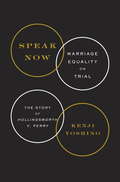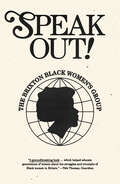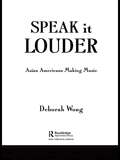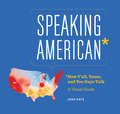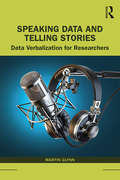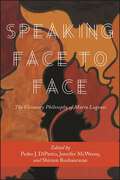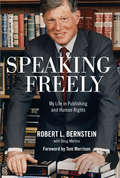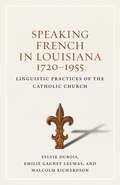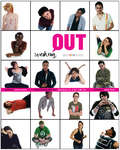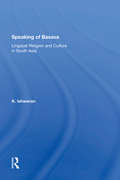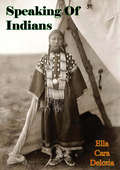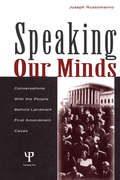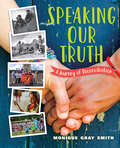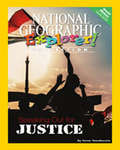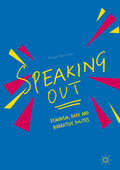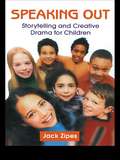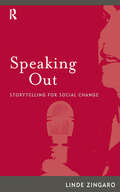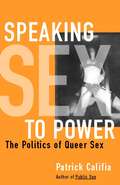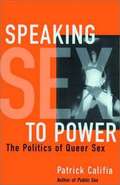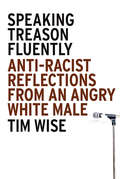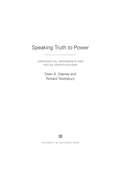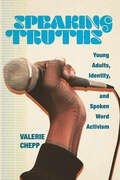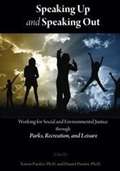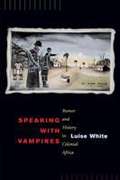- Table View
- List View
Speak Now: Marriage Equality on Trial
by Kenji YoshinoA renowned legal scholar tells the definitive story of Hollingsworth v. Perry, the trial that will stand as the most potent argument for marriage equalitySpeak Now tells the story of a watershed trial that unfolded over twelve tense days in California in 2010. A trial that legalized same-sex marriage in our most populous state. A trial that interrogated the nature of marriage, the political status of gays and lesbians, the ideal circumstances for raising children, and the ability of direct democracy to protect fundamental rights. A trial that stands as the most potent argument for marriage equality this nation has ever seen. In telling the story of Hollingsworth v. Perry, the groundbreaking federal lawsuit against Proposition 8, Kenji Yoshino has also written a paean to the vanishing civil trial--an oasis of rationality in what is often a decidedly uncivil debate. Above all, this book is a work of deep humanity, in which Yoshino brings abstract legal arguments to life by sharing his own story of finding love, marrying, and having children as a gay man. Intellectually rigorous and profoundly compassionate, Speak Now will stand as the definitive account of a landmark civil-rights trial.From the Hardcover edition.assionate, and beautifully written, Speak Now is both a nuanced and authoritative account of a landmark trial, and a testament to how the clash of proofs in our judicial process can force debates to the ultimate level of clarity.From the Hardcover edition.
Speak Out!: The Brixton Black Women's Group
by Brixton Black Women's GroupThe first ever collection of writing from the Brixton Black Women&’s Group, one of the first and most important black radical organisations of the 1970s"We came to Britain in search of better opportunities or to get some of the wealth which had been misappropriated from the Caribbean, but what in reality did we find?Speak Out brings together the writings of Brixton Black Women's Group for the first time, in a landmark collection. Established in response to the lack of interest in women's issues experienced in male-dominated Black organisations, the Brixton Black Women's Group's aim was to create a distinct space where women of African and Asian descent could meet to focus on political, social and cultural issues as they affected black women.Brixton Black Women&’s Group published its own newsletter, Speak Out, which kept alive the debate about the relevance of feminism to black politics and provided a black women's perspective on immigration, housing, health and culture.
Speak it Louder: Asian Americans Making Music
by Deborah WongSpeak It Louder: Asian Americans Making Music documents the variety of musics-from traditional Asian through jazz, classical, and pop-that have been created by Asian Americans. This book is not about "Asian American music" but rather about Asian Americans making music. This key distinction allows the author to track a wide range of musical genres. Wong covers an astonishing variety of music, ethnically as well as stylistically: Laotian song, Cambodian music drama, karaoke, Vietnamese pop, Japanese American taiko, Asian American hip hop, and panethnic Asian American improvisational music (encompassing jazz and avant-garde classical styles). In Wong's hands these diverse styles coalesce brilliantly around a coherent and consistent set of questions about what it means for Asian Americans to make music in environments of inter-ethnic contact, about the role of performativity in shaping social identities, and about the ways in which commercially and technologically mediated cultural production and reception transform individual perceptions of time, space, and society. Speak It Louder: Asian Americans Making Music encompasses ethnomusicology, oral history, Asian American studies, and cultural performance studies. It promises to set a new standard for writing in these fields, and will raise new questions for scholars to tackle for many years to come.
Speaking American: A Visual Guide
by Josh KatzFrom the creator of the New York Times dialect quiz that ignited conversations about how and why we say the words we say, a stunning and delightful exploration of American language Did you know that your answers to just a handful of questions can reveal where you grew up? In December 2013, Josh Katz released an interactive dialect quiz in the New York Times that became the most viewed page in the paper's history. Now a graphics editor, Katz harnessed the overwhelming response to that quiz to create Speaking American, an extraordinary and beautiful tour through the American vernacular. How do you pronounce "pecan"? What do you call a long sandwich with varieties of meats and cheeses? Do you cut the grass or mow the lawn? The answers to these questions—and the distinctions they reveal about who says what and where they say it—are not just the ultimate in cocktail party fodder; they are also windows into the history of our nation, our regions, and our language. On page after page, readers will be fascinated and charmed by these stunning maps of how Americans speak as they gain new insights into our language and ourselves. For fans of Eats, Shoots and Leaves and How the States Got Their Shapes, Speaking American is an irresistible feast of American regional speech.
Speaking Data and Telling Stories: Data Verbalization for Researchers
by Martin GlynnSpeaking Data and Telling Stories examines the interdependent relationship between method (Data Verbalization) and practice (performance). Data Verbalization is about communicating and disseminating research data using performance approaches and techniques such as; spoken word, jazz, hip-hop, and reggae theatrics. Martin Glynn calls for the development of performance-driven research dissemination that seeks to bring urgent attention to minority, excluded, and marginalized perspectives within research dissemination as a whole. Employing the data verbalization method creates an exciting new proposition that can give progressive researchers a unique and distinct voice, alongside generating significant reach and impact beyond the academy, conference, and peer reviewed journal. The book will be an invaluable resource for researchers, scholars, and related practitioners who want to strengthen their ability to communicate and disseminate research data using live performance / spoken word approaches and techniques. It will also provide guidance for students and researchers wanting to generate wider environmental, social, and cultural impact using research data creatively.
Speaking Face to Face: The Visionary Philosophy of María Lugones (SUNY series, Praxis: Theory in Action)
by Pedro J. DiPietro; Jennifer McWeeny; Shireen RoshanravanSpeaking Face to Face provides an unprecedented, in-depth look at the feminist philosophy and practice of the renowned Argentinian-born scholar-activist María Lugones. Informed by her identification as "nondiasporic Latina" and US Woman of Color, as well as her long-term commitment to grassroots organizing in Chicana/o communities, Lugones's work dovetails with, while remaining distinct from, that of other prominent transnational, decolonial, and women of color feminists. Her visionary philosophy motivates transformative modes of engaging cultural others, inviting us to create political intimacies rooted in a shared yearning for interdependence.Bringing together scholars and activists across fields, this volume charts her profound impact in and beyond the academy for the past thirty years. In so doing, it exemplifies a new method of coalitional theorizing—traversing racial, ethnic, sexual, national, gendered, political, and disciplinary borders in order to cultivate learning, embrace heterogeneity, and provide a unique framework for engaging contemporary debates about identity, oppression, and activism. Across thirteen original contributions, authors address issues of intersectionality, colonial and decolonial subjectivities, the multiplicity and the coloniality of gender, indigenous spiritualities and cosmologies, pluralist and women of color feminisms, radical multiculturalism, popular education, and resistance to multiple oppressions. The book also includes a rare interview with María Lugones and an afterword by Paula Moya, ultimately offering both new critical resources for longstanding admirers of Lugones and a welcome introduction for newcomers to her groundbreaking work.
Speaking Freely: My Life in Publishing and Human Rights
by Toni Morrison Robert L. BernsteinWhat do Dr. Seuss, William Faulkner, Toni Morrison, Andrei Sakharov, and James Michener have in common? They were all published by Bob Bernstein during his twenty-five-year run as president of Random House, before he brought the dissidents Liu Binyan, Jacobo Timerman, Natan Sharansky, and Václav Havel to worldwide attention in his role as the father of modern human rights.Starting as an office boy at Simon & Schuster in 1946, Bernstein moved to Random House in 1956 and succeeded Bennett Cerf as president ten years later. The rest is publishing and human rights history.In a charming and self-effacing work, Bernstein reflects for the first time on his fairy tale publishing career, hobnobbing with Truman Capote and E.L. Doctorow; conspiring with Kay Thompson on the Eloise series; attending a rally for Random House author George McGovern with film star Claudette Colbert; and working with publishing luminaries including Dick Simon, Alfred Knopf, Robert Gottlieb, André Schiffrin, Peter Osnos, Susan Peterson, and Jason Epstein as Bernstein grew Random House from a $40 million to an $800 million-plus "money making juggernaut," as Thomas Maier called it in his biography of Random House owner Si Newhouse. In a book sure to be savored by anyone who has worked in the publishing industry, fought for human rights, or wondered how Theodor Geisel became Dr. Seuss, Speaking Freely beautifully captures a bygone era in the book industry and the first crucial years of a worldwide movement to protect free speech and challenge tyranny around the globe.
Speaking French in Louisiana, 1720-1955: Linguistic Practices of the Catholic Church
by Malcolm Richardson Sylvie DuBois Emilie Gagnet LeumasOver the course of its three-hundred-year history, the Catholic Church in Louisiana witnessed a prolonged shift from French to English, with some south Louisiana churches continuing to prepare marriage, baptism, and burial records in French as late as the mid-twentieth century. Speaking French in Louisiana, 1720–1955 navigates a complex and lengthy process, presenting a nuanced picture of language change within the Church and situating its practices within the state’s sociolinguistic evolution. Mining three centuries of evidence from the Archdiocese of New Orleans archives, the authors discover proof of an extraordinary one-hundred-year rise and fall of bilingualism in Louisiana. The multiethnic laity, clergy, and religious in the nineteenth century necessitated the use of multiple languages in church functions, and bilingualism remained an ordinary aspect of church life through the antebellum period. After the Civil War, however, the authors show a steady crossover from French to English in the Church, influenced in large part by an active Irish population. It wasn’t until decades later, around 1910, that the Church began to embrace English monolingualism and French faded from use. The authors’ extensive research and analysis draws on quantitative and qualitative data, geographical models, methods of ethnography, and cultural studies. They evaluated 4,000 letters, written mostly in French, from 1720 to 1859; sacramental registers from more than 250 churches; parish reports; diocesan council minutes; and unpublished material from French archives. Their findings illuminate how the Church’s hierarchical structure of authority, its social constraints, and the attitudes of its local priests and laity affected language maintenance and change, particularly during the major political and social developments of the nineteenth and early twentieth centuries. Speaking French in Louisiana, 1720–1955 goes beyond the “triumph of English” or “tragedy of Cajun French” stereotypes to show how south Louisiana negotiated language use and how Christianization was a powerful linguistic and cultural assimilator.
Speaking OUT: Queer Youth in Focus
by Graeme Taylor Candace GingrichWinner of:2015 Rainbow Award Winner; Best Bisexual, Transgender & LGBT DebutA photographic essay that explores a wide spectrum of experiences told from the perspective of a diverse group of young people, ages 14–24, identifying as queer (lesbian, gay, bisexual, transgender, or questioning), Speaking OUT: Queer Youth in Focus presents portraits without judgment or stereotype by eliminating environmental influence with a stark white backdrop. This backdrop acts as a blank canvas, where each subject's personal thoughts are handwritten onto the final photographic print. With more than 65 portraits photographed over a period of 10 years, the book provides rare insight into the passions, confusions, prejudices, joys, and sorrows felt by queer youth and gives a voice to an underserved group of people that are seldom heard and often silenced. The collaboration of image and first-person narrative serves to provide an outlet, show support, create dialogue, and help those who struggle.
Speaking Of Basava: Lingayat Religion And Culture In South Asia
by K. Ishwaran K IshwaranThe bulk of the literature on Basava and Lingayatism incorporates both the Brahman and Bhakti movements. To do this is to lose sight of innovations that Basava introduced in reaction to his Brahman-dominated environment. Also, to look at Lingayatism as a direct linear descendant of the Hindu tradition is to ignore the revolutionary thrust of Lingayatism in its origin in the twelfth century A.O. and its continuing dynamism in the subsequent centuries.
Speaking Of Indians
by Ella Cara Deloria Vine Deloria Jr.Beginning with a general discussion of American Indian origins, language families, and culture areas, Deloria then focuses on her own people, the Dakotas, and the intricate kinship system that governed all aspects of their life. She writes, "Exacting and unrelenting obedience to kinship demands made the Dakotas a most kind, unselfish people, always acutely aware of those about them and innately courteous."Deloria goes on to show the painful transition to reservations and how the holdover of the kinship system worked against Indians trying to follow white notions of progress and success. Her ideas about what both races must do to participate fully in American life are as cogent now as when they were first written.Originally published in 1944, "Speaking of Indians" is an important source of information about Dakota culture and a classic in its elegant clarity of insight.
Speaking Our Minds: Conversations With the People Behind Landmark First Amendment Cases (Routledge Communication Series)
by Joseph RussomannoTinker. R.A.V. Ollman. Hustler-Falwell. Reno-ACLU. Nebraska Press Association. These names are synonymous with contemporary First Amendment litigation. To explore these landmark cases more deeply, author Joseph Russomanno interviewed the people at the core of these and other influential First Amendment cases, and he presents their stories here in a personal, in-depth oral history of First Amendment law. Previously unavailable in other literature, these stories go beyond the "what" of the cases and answer the "why" and "how" of ten major cases from the latter part of the 20th century. Through their own words and photographs, plaintiffs, defendants, and their attorneys describe what it was like to be involved in the development of these historic First Amendment cases. The issues addressed in these landmark cases cover crucial aspects of the First Amendment: freedom of expression, hate speech, libel, privacy, intentional infliction of emotional distress, promises of confidentiality to news sources, free press-fair trial, commercial speech, broadcast and cable television regulation, and new media. These narratives recount the events that initiated the court cases and follow the lead players through the various stages of the U.S. legal system. Excerpts of the court decisions are included at the conclusion of each chapter, and sidebars explain key terms, issues, and names that come up in the process. The cases highlighted here were often difficult and controversial--cases which, on their surface, raise questions about both the participants and their lawyers. A cross burner and a pornographer ask to be protected by the First Amendment; a measure intended to protect children from exposure to lewd content on the Internet is questioned. Through the words of the participants in these cases, the meaning, depth, and reach of the First Amendment becomes clear and demonstrates how the law functions to protect the rights of all individuals. This unique chronicle will appeal to those studying First Amendment law, including mass communication, law, journalism, and political science scholars, and to lawyers, journalists, and political scientists with an interest in this area. The volume is also intended to serve as a supplemental text in a mass communication law course or as a text in advanced First Amendment theory course and political science courses exploring the law, decisions, and processes of the U. S. Supreme Court.
Speaking Our Truth: A Journey of Reconciliation
by Monique Gray SmithCanada's relationship with its Indigenous people has suffered as a result of both the residential school system and the lack of understanding of the historical and current impact of those schools. <P><P>Healing and repairing that relationship requires education, awareness and increased understanding of the legacy and the impacts still being felt by survivors and their families. <P><P> Guided by acclaimed Indigenous author Monique Gray Smith, readers will learn about the lives of Survivors and listen to allies who are putting the findings of the Truth and Reconciliation Commission into action.
Speaking Out: Feminism, Rape and Narrative Politics
by Tanya SerisierThis is the first critical study of feminist practices of ‘speaking out’ in response to rape. This book argues that feminist anti-rape politics are characterised by a belief in the transformative potential of women’s personal narratives of sexual violence. The political mobilisation of these narratives has been an incredibly successful strategy, but one with unresolved ethical questions and political limitations. The book explores both the successes and the unresolved questions through feminist archival materials, published narratives of sexual violence, and mass media and internet sources. It argues that that a rethinking of the role and place of women’s stories and the politics of speaking out is vital for a rethinking of feminist politics around sexual violence and key to fresh approaches to combating this violence.
Speaking Out: Storytelling and Creative Drama for Children
by Jack ZipesIn his successful Creative Storytelling, Jack Zipes showed how storytelling is a rich and powerful tool for self-expression and for building children's imaginations. In Speaking Out, this master storyteller goes further, speaking out against rote learning and testing and for the positive force within storytelling and creative drama during the K-12 years.For the past four years, Jack Zipes has worked with the Neighborhood Bridges Program of the Children's Theatre Company of Minneapolis, taking his storytelling techniques into inner-city schools. Speaking Out is in part a record of the transformations storytelling can work on the minds and lives of young people. But it is also a vivid and exhilarating demonstration of a different kind of education - one built from deep inside each child. Speaking Out is a book for storytellers, educators, parents, and anyone who cares about helping kids find within themselves the keys to imagination.
Speaking Out: Storytelling for Social Change (Int'l Inst Qualitative Methodology Serie Ser.)
by Linde ZingaroMany professionals in health, education, and community service roles are caught in a particular bind of identity—they live in a complex social borderland of credibility and professional authority while experiencing or having experienced the same discrimination, violence or trauma that they are committed to conquering. For some, the disclosure of their own stories of marginalization has become a tool for advocacy, for telling a larger truth; for others, self-disclosure is a more personal action, intended to assist isolated others in developing trust and connection. Linde Zingaro, a lifelong social service worker and activist, interviewed several colleagues who have chosen to speak out in this way, talking with them about their ethics and intentions, and collaborating to identify some of the risks of negative personal and professional consequences for the practitioner. She uses their voices—and her own—to illustrate some of the ways that these people have learned to safely and effectively use the transformative potential of storytelling as significant social action. This examination of speaking out as a meaningful social practice may help other workers, activists, and community researchers in their efforts to be heard in the interests of a more just society.
Speaking Peace: Women’s Voices from Kashmir
by Urvashi ButaliaThis book reflects the range of women's experiences in the Kashmir conflict, which, for some years, has been a key issue on the Indian political map.
Speaking Sex to Power
by Patrick CalifiaHailed "a revolutionary antidote to America's growing sexual conservatism," Patrick Califia is the most outspoken and intelligent commentator on sexual politics writing today. Following the acclaimed publication of Public Sex and Sex Changes, Califia once again exposes American mainstream culture with unrivaled brillance and integrity.As controversial in writing about the private sphere as the public, Califia speaks intimately of changing his gender identy from female to male and becoming a parent in a two-fathered household. Speaking Sex to Power takes the reader on a remarkable intellectual journey with one of America's most audacious thinkers.
Speaking Sex to Power: The Politics of Queer Sex
by Patrick CalifiaSome of the essays were written before Califia began transitioning from female to male and are written from a lesbian perspective. Others ware written both mid- and post-transition. Essays from the late-'90s to early-2000's that were previously published in various formats. They have been grouped into 4 categories, each with a new introductory long essay further discussing the overall category. "The Engagement Party" covers the inclusion of all kinds of sexual minorities, and Califia's perspective that there is an exclusionary hierarchy in existence. The 2nd grouping is "Like Cats and Dogs", which more specifically details politics between various sexual minority groups: gays vs. lesbians, lesbians vs. transsexuals of either direction, able-bodied queers vs. those with disabilities, HIV in the trans community, etc. The 3rd section, "Destroying the Village in Order to Save It," is the most dated, yet the most factual as possibly most educational as opposed to the author's political perspectives. There are articles about the First Amendment, porn, HIV/AIDS as a financial windfall for pharmaceutical companies, the reduction of research aimed at a cure, the very informative "The Nonoxynol-9 Scandal: How 'AIDS Prevention' Put Women and Gay men at Risk." Many of the essays are heavily footnoted with direct sources. The final category is "An Insistent and Indelicate Muse" which veers off to BDSM sex: Bondage, Domination and Sadomasochism. Essays discuss why some people enjoy the various roles, cutting flesh and how, and other aspects. The author writes from personal experience.
Speaking Treason Fluently: Anti-Racist Reflections From an Angry White Male
by Tim WiseIn this highly anticipated follow-up to White Like Me: Reflections on Race from a Privileged Son, activist Tim Wise examines the way in which institutional racism continues to shape the contours of daily life in the United States, and the ways in which white Americans reap enormous privileges from it.The essays included in this collection span the last ten years of Wise’s writing and cover all the hottest racial topics of the past decade: affirmative action, Hurricane Katrina, racial tension in the wake of the Duke lacrosse scandal, white school shootings, racial profiling, phony racial unity in the wake of 9/11, and the political rise of Barack Obama. Wise’s commentaries make forceful yet accessible arguments that serve to counter both white denial and complacency-two of the main obstacles to creating a more racially equitable and just society. Speaking Treason Fluently is a superbly crafted collection of Wise’s best work, which reveals the ongoing salience of race in America today and demonstrates that racial privilege is not only a real and persistent problem, but one that ultimately threatens the health and well-being of the entire society.
Speaking Truth to Power: Confidential Informants and Police Investigations
by Dean A. Dabney Richard TewksburyDomestic drug enforcement takes many forms, from the rural patrol officer who happens upon a small-scale mobile "shake and bake" methamphetamine lab during a routine traffic stop, to the city narcotics detective who initiates a low-level buy-bust operation that nets a few hits of crack cocaine on the street corner, to the local, state, and federal agents working in multiagency task forces that coordinate a sting operation that nets thousands of kilos of near-pure cocaine being transported by tractor-trailer. Regardless of the form, there is a high probability that these authorities have exploited access to known offenders and exerted pressure on those individuals to gather inside information on illicit drug sales. These confidential informants provide intelligence on the inner workings of drug operations in exchange for leniency or remuneration, providing a relatively cheap source of intelligence that fuels much of the ongoing war on drugs. In other instances, law enforcement authorities will reach out to members of the criminal underworld who are willing to provide valuable intelligence in exchange for money. Despite the central role of informants in contemporary police operations, little is known about the shadowy relationships among law enforcement, snitches, and offenders. Based on ethnographic fieldwork in the narcotics, homicide, and street-level vice operations in two major metropolitan police departments, Speaking Truth to Power takes readers to the front lines of the war on drugs to unravel this complex web of information exchange.
Speaking Truths: Young Adults, Identity, and Spoken Word Activism
by Valerie CheppThe twenty-first century is already riddled with protests demanding social justice, and in every instance, young people are leading the charge. But in addition to protesters who take to the streets with handmade placards are young adults who engage in less obvious change-making tactics. In Speaking Truths, sociologist Valerie Chepp goes behind-the-scenes to uncover how spoken word poetry—and young people’s participation in it—contributes to a broader understanding of contemporary social justice activism, including this generation’s attention to the political importance of identity, well-being, and love. Drawing upon detailed observations and in-depth interviews, Chepp tells the story of a diverse group of young adults from Washington, D.C. who use spoken word to create a more just and equitable world. Outlining the contours of this approach, she interrogates spoken word activism’s emphasis on personal storytelling and “truth,” the strategic uses of aesthetics and emotions to politically engage across difference, and the significance of healing in sustainable movements for change. Weaving together their poetry and personally told stories, Chepp shows how poets tap into the beautiful, emotional, personal, and therapeutic features of spoken word to empathically connect with others, advance intersectional and systemic analyses of inequality, and make social justice messages relatable across a diverse public. By creating allies and forging connections based on friendship, professional commitments, lived experiences, emotions, artistic kinship, and political views, this activist approach is highly integrated into the everyday lives of its practitioners, online and face-to-face. Chepp argues that spoken word activism is a product of, and a call to action against, the neoliberal era in which poets have come of age, characterized by widening structural inequalities and increasing economic and social vulnerability. She illustrates how this deeply personal and intimate activist approach borrows from, builds upon, and diverges from previous social movement paradigms. Spotlighting the complexity and mutual influence of modern-day activism and the world in which it unfolds, Speaking Truths contributes to our understanding of contemporary social change-making and how neoliberalism has shaped this political generation’s experiences with social injustice.
Speaking Up and Speaking Out: Working for Social and Environmental Justice through Parks, Recreation, and Leisure
by Karen Paisley Daniel DustinWho speaks up for the disadvantaged? Who speaks out for the disenfranchised? Who safeguards the rights of the dispossessed? Speaking Up and Speaking Out explores the role of parks, recreation, and leisure in promoting social and environmental justice.
Speaking With Vampires: Rumor and History in Colonial Africa
by Luise WhiteLuise White presents and interprets vampire stories from East and Central Africa as a way of understanding the world as the storytellers did. Using gossip and rumor as historical sources in their own right, she assesses the place of such evidence, oral and written, in historical reconstruction.
